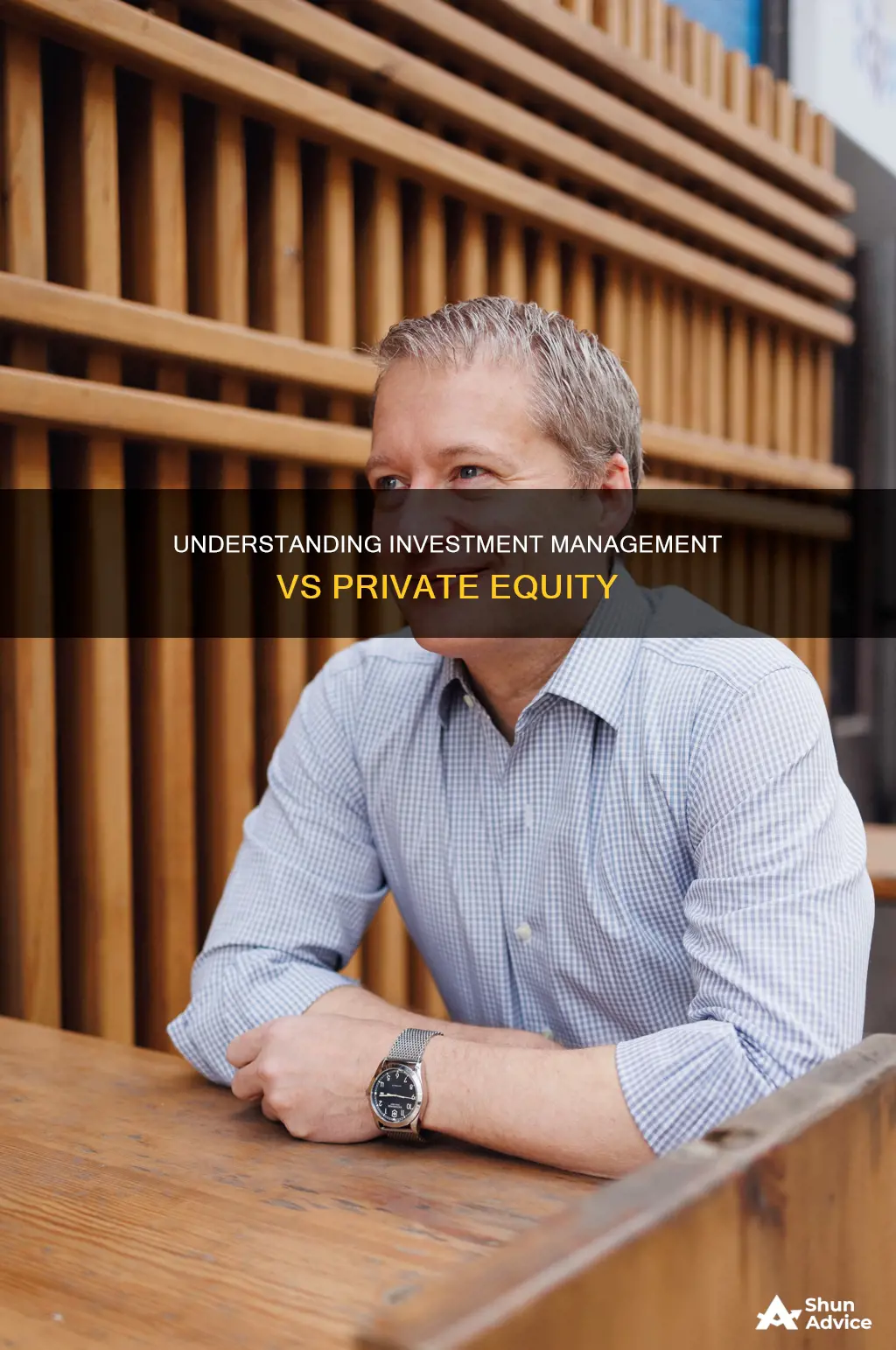
Investment management and private equity are two distinct investment strategies with different methodologies and goals, catering to diverse investor profiles. Investment management, also known as asset management, involves the professional management of various investments like stocks, bonds, real estate, and other securities to achieve specific financial objectives. It focuses on diversification, risk management, continuous monitoring, and re-balancing to align with the investor's goals and financial markets' dynamics. On the other hand, private equity entails investing directly in private companies or acquiring public companies to delist them from stock exchanges. Private equity firms typically invest in struggling or mature companies, aiming to restructure and improve their operations to sell them at a profit. While investment management offers liquidity and diversification, private equity demands a long-term commitment with higher risk and the potential for substantial returns. The choice between the two depends on investors' financial goals, risk appetite, and investment horizons.
| Characteristics | Investment Management | Private Equity |
|---|---|---|
| Time Horizon of Investments | More liquid investment, bought or sold with relative ease | Long-term commitment of funds, often for several years |
| Level of Involvement | Passive investors, with the investment firm making decisions about buying and selling assets | Active role in the strategic management of the firms |
| Returns | Capital appreciation and income generated from the investment | Capital appreciation upon the exit from the investment |
| Investment Type | Diversified investments across asset types | Direct investment in private firms or buyouts of public companies |
| Risk | Lower potential returns | Higher potential returns |
What You'll Learn

Investment timeframe
The investment timeframe is a key difference between asset management and private equity. Asset management offers a more liquid investment with greater flexibility, allowing investors to buy or sell with relative ease. This suits those who may need access to their capital sooner. Private equity, on the other hand, typically involves a long-term commitment of funds, often for several years. This makes it more suitable for investors with a longer financial horizon who can keep their capital locked in for extended periods.
Private equity funds have a finite term, usually between 10 and 12 years, and the money invested is not available for subsequent withdrawals. While they start distributing profits to investors after a few years, the average holding period for a private equity portfolio company was 5.6 years in 2023.
Asset management companies usually focus on the personal finance of their clients and invest for a shorter timeframe, typically holding an asset for between three and six months. They cater to a diverse range of clients, including large and small organisations, insurance companies, pension fund organisations, government institutions, and high-net-worth individuals.
Private equity firms, on the other hand, focus on the investments made by their clients and take a long-term approach. They invest in companies for several years, allowing time for strategic plans and operational improvements to increase the company's value before exiting the investment.
Unlocking Your Savings: Reading Investment Statements
You may want to see also

Nature of investment
The nature of investment is a key difference between investment management and private equity. Investment management, also known as asset management, focuses on diversifying investments across various asset classes such as stocks, bonds, real estate, and other securities. The goal is to achieve specific financial goals and manage risk by spreading investments across multiple assets.
On the other hand, private equity involves investing directly in private companies or conducting buyouts of public companies, resulting in their delisting from stock exchanges. Private equity firms typically seek to gain ownership and control of the companies they invest in, with the primary goal of increasing the company's value and eventually selling it for a profit.
Private equity investments often require a deep understanding of the business landscape, rigorous due diligence, and an active, hands-on approach to unlocking value. They tend to focus on a specific category of deals, such as distressed investing, growth equity, or sector-specific investments.
In terms of investment timeframe, asset management caters to individuals or entities seeking more liquid investments with shorter timeframes, while private equity firms typically operate with longer investment horizons of 3 to 10 years or more.
The nature of the investment also differs in terms of risk and return. Asset management provides more diversification and stability but may offer lower potential returns compared to private equity. Private equity, on the other hand, offers the potential for higher returns but comes with increased risk due to the leveraged and illiquid nature of the investments.
Commodities in Your Portfolio: What's the Right Mix?
You may want to see also

Level of involvement
Private equity investors are often actively involved in the strategic management of the companies they invest in. This involvement ensures that their investment vision is realised in the operational performance of the company. The level of involvement can range from strategic guidance to a complete overhaul of the existing management team.
On the other hand, investors in asset management tend to be passive, entrusting the daily management to experts while retaining oversight. Asset managers make decisions about buying and selling assets, and they use a combination of market research, trend analysis, and financial forecasting to make informed decisions.
Private equity investors play a more hands-on role, ensuring the company moves in a direction that maximises value and potential returns. They may bring in their own management team or retain prior managers to execute an agreed-upon plan. Private equity investors can also influence operational changes, helping to unlock value and increase returns by applying their expertise and strategic vision to the company's operational performance.
The level of involvement in asset management offers more flexibility and liquidity, allowing investors to adapt to unforeseen events or capitalise on emerging opportunities. Private equity, on the other hand, involves a long-term commitment of funds, with investors needing to be prepared to commit their money for an extended period, usually several years.
In summary, private equity investors are actively involved in strategic management, ensuring their vision is realised, while asset management investors are typically more passive, entrusting day-to-day decisions to experts but retaining oversight. The level of involvement differs, with private equity investors playing a more hands-on role and asset management investors benefiting from greater flexibility and liquidity.
Passive Investment Management: Strategy, Benefits, and Drawbacks
You may want to see also

Time horizon of investments
The time horizon of an investment is the period of time an investor expects to hold a particular security or investment. This can vary from a few days to several decades. The time horizon is dictated by the investment goals and strategies of the investor. For example, saving for a down payment on a house might be a short-term goal, while saving for retirement is a long-term goal.
The time horizon of an investment is important because it determines the types of investment products that are suitable for the investor's goals. Generally, investors seek stable assets for short-term investing and are willing to take on more risk for long-term investments.
Private equity funds are associated with medium to long-term time horizons, typically investing for 10 or more years. Private equity firms focus on investing in companies with the potential for substantial profits over the long term. They are not interested in acquiring or running companies, but rather in improving their performance to sell their interest for a profit once the company is profitable.
On the other hand, investment management firms, such as asset management companies, may cater to investors with a range of time horizons. These firms offer investment management services to individuals and organisations to help them achieve their financial goals. They identify, evaluate, and select assets to build an investment portfolio tailored to the client's risk tolerance, time horizon, and objectives.
While private equity firms focus on long-term investments in companies, asset management companies may invest in a variety of assets, including stocks, bonds, and money market funds, depending on the client's needs. As a result, they can offer more flexibility and liquidity, making them suitable for both short and long-term investors.
Security Analysis and Investment Management: Core Financial Concepts
You may want to see also

Risk and returns
Private equity and investment management differ in terms of risk and returns, with private equity often offering higher potential returns but also carrying greater risk.
Private Equity Risk and Returns
Private equity involves investing in private companies or conducting buyouts of public companies, which are then delisted. This type of investment is considered high risk due to the nature of the underlying investments. Private equity money is often invested in new companies or startups with high growth potential, but there is no guarantee that these companies will succeed. As such, private equity investments can result in significant gains or substantial losses.
Private equity investments also carry liquidity risk, as investors are expected to commit their funds for several years, and market risk, as many of the companies invested in are unproven. Additionally, private equity investments may involve the use of significant debt, which can be costly over time.
Investment Management Risk and Returns
Investment management, on the other hand, offers greater flexibility and liquidity, allowing investors to buy or sell their investments with relative ease. This type of investment is suitable for those who may need access to their capital sooner and prefer a more diversified portfolio to mitigate risk.
Investment managers strive for capital appreciation and focus on total returns, including gains from interest, dividends, and the increase in the value of the asset. This comprehensive approach helps to achieve the investor's financial goals and ensure that all potential sources of profit are tapped into.
Choosing Between Private Equity and Investment Management
The choice between private equity and investment management depends on an investor's financial goals, risk appetite, and investment horizon. Private equity is suitable for investors with a long-term investment horizon, higher risk tolerance, and the capacity to commit substantial funds for an extended period. On the other hand, investment management is more appropriate for investors seeking steady returns, diversification, and flexibility in withdrawing their investments.
Crafting a Compelling Investment Narrative: Guide to Portfolio Storytelling
You may want to see also
Frequently asked questions
Investment management focuses on professional portfolio management and diversification, ideal for risk-averse investors. Private equity, on the other hand, offers direct ownership in private companies, providing higher returns but also greater risk.
Investment management deals with a wide range of publicly traded assets, including stocks, bonds, and mutual funds. It offers high liquidity, allowing investors to easily buy or sell their holdings. Private equity, meanwhile, focuses on privately held businesses, and its investments are typically illiquid, requiring a long-term commitment.
In investment management, investors typically have no direct control over the underlying assets. Private equity investors, on the other hand, often take an active role in the management of the companies they invest in, collaborating closely with management teams to drive growth.
Investment management firms typically invest in older, more established companies using public capital. Private equity firms, on the other hand, tend to invest in younger companies, startups, or financially struggling businesses, often using personal money to gain ownership and influence decision-making.
Investment management services cater to a broad range of investors, from individuals with modest savings to large institutional clients. Private equity, due to its higher risk and longer investment horizon, is more suitable for investors with a higher risk tolerance and a long-term investment horizon.







